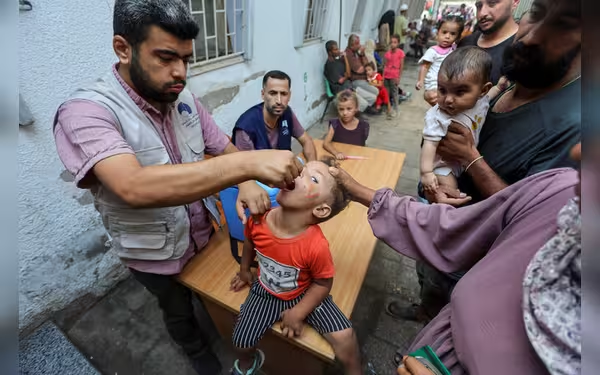Thursday, November 7, 2024 05:50 PM
UN Completes Polio Vaccination Campaign in Gaza
- Over 556,000 children vaccinated against polio in Gaza.
- 7,000 to 10,000 children remain unvaccinated in northern Gaza.
- Humanitarian pauses essential for health interventions in conflict zones.
 Image Credits: arabnewspk
Image Credits: arabnewspkThe UN announces the successful completion of its polio vaccination campaign in Gaza, protecting over 556,000 children amidst ongoing conflict.
In a significant development amidst the ongoing Israel-Hamas conflict, the United Nations has announced the successful completion of its polio vaccination campaign in Gaza. This initiative aimed to protect the health of children in the region, where the threat of polio loomed large due to the recent outbreak. The campaign, which saw over half a million children vaccinated, is a remarkable achievement given the challenging circumstances under which it was conducted.
The World Health Organization (WHO) and UNICEF launched the vaccination drive in response to the first confirmed polio case in Gaza in 25 years. The campaign began on September 1, and despite interruptions caused by military actions, a second round of vaccinations was successfully completed on Tuesday, with a total of 556,774 children under the age of 10 receiving their second dose. This is particularly crucial as polio is a highly infectious disease that can lead to severe health complications, including paralysis and even death, especially in young children.
However, the situation remains dire for many children in northern Gaza. An estimated 7,000 to 10,000 children are still trapped in areas that are difficult to access, leaving them unvaccinated and vulnerable to the poliovirus. The UN agencies have expressed concern over these children, emphasizing the need for continued humanitarian efforts in the region.
Despite the challenges, the vaccination campaign has been hailed as a success by COGAT, the Israeli defense ministry body responsible for civilian affairs in the Palestinian territories. The WHO and UNICEF have reiterated the importance of humanitarian pauses in military actions to allow for essential health interventions, not just for polio but for other pressing health needs as well.
As the world watches the unfolding events in Gaza, the completion of this vaccination campaign serves as a reminder of the resilience of humanitarian efforts even in the face of adversity. It highlights the critical need for ongoing support and intervention to protect the health and well-being of children in conflict zones. The call for a ceasefire and the establishment of safe corridors for humanitarian aid is more urgent than ever, as the health of future generations hangs in the balance.













